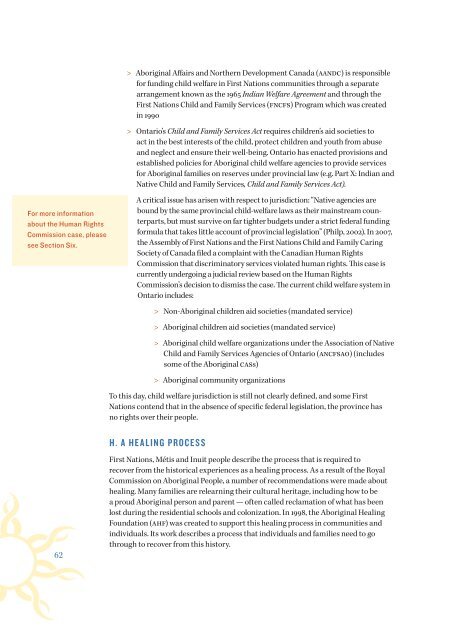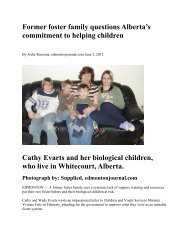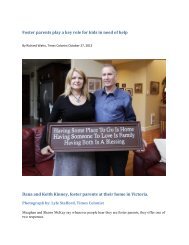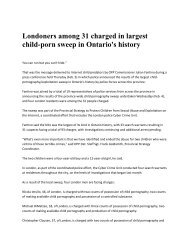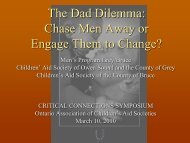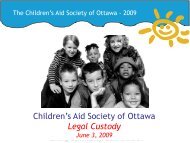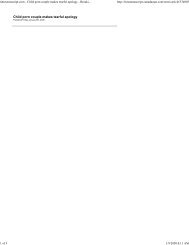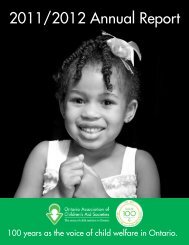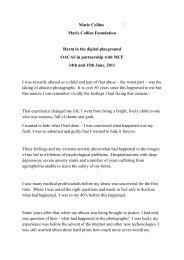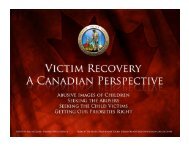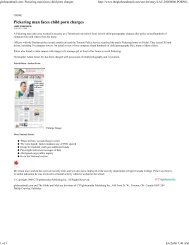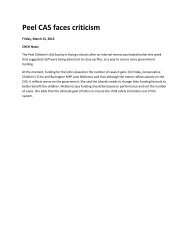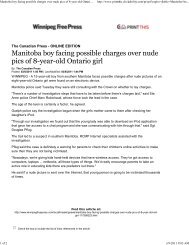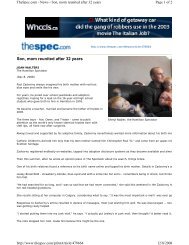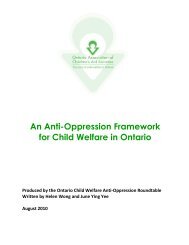English - Ontario Association of Children's Aid Societies
English - Ontario Association of Children's Aid Societies
English - Ontario Association of Children's Aid Societies
Create successful ePaper yourself
Turn your PDF publications into a flip-book with our unique Google optimized e-Paper software.
Aboriginal Affairs and Northern Development Canada (AANDC) is responsible<br />
for funding child welfare in First Nations communities through a separate<br />
arrangement known as the 1965 Indian Welfare Agreement and through the<br />
First Nations Child and Family Services (FNCFS) Program which was created<br />
in 1990<br />
> > <strong>Ontario</strong>’s Child and Family Services Act requires children’s aid societies to<br />
act in the best interests <strong>of</strong> the child, protect children and youth from abuse<br />
and neglect and ensure their well-being. <strong>Ontario</strong> has enacted provisions and<br />
established policies for Aboriginal child welfare agencies to provide services<br />
for Aboriginal families on reserves under provincial law (e.g. Part X: Indian and<br />
Native Child and Family Services, Child and Family Services Act).<br />
For more information<br />
about the Human Rights<br />
Commission case, please<br />
see Section Six.<br />
A critical issue has arisen with respect to jurisdiction: “Native agencies are<br />
bound by the same provincial child-welfare laws as their mainstream counterparts,<br />
but must survive on far tighter budgets under a strict federal funding<br />
formula that takes little account <strong>of</strong> provincial legislation” (Philp, 2002). In 2007,<br />
the Assembly <strong>of</strong> First Nations and the First Nations Child and Family Caring<br />
Society <strong>of</strong> Canada filed a complaint with the Canadian Human Rights<br />
Commission that discriminatory services violated human rights. This case is<br />
currently undergoing a judicial review based on the Human Rights<br />
Commission’s decision to dismiss the case. The current child welfare system in<br />
<strong>Ontario</strong> includes:<br />
> > Non-Aboriginal children aid societies (mandated service)<br />
> > Aboriginal children aid societies (mandated service)<br />
> > Aboriginal child welfare organizations under the <strong>Association</strong> <strong>of</strong> Native<br />
Child and Family Services Agencies <strong>of</strong> <strong>Ontario</strong> (ANCFSAO) (includes<br />
some <strong>of</strong> the Aboriginal CASs)<br />
> > Aboriginal community organizations<br />
To this day, child welfare jurisdiction is still not clearly defined, and some First<br />
Nations contend that in the absence <strong>of</strong> specific federal legislation, the province has<br />
no rights over their people.<br />
62<br />
H. A HEALING PROCESS<br />
First Nations, Métis and Inuit people describe the process that is required to<br />
recover from the historical experiences as a healing process. As a result <strong>of</strong> the Royal<br />
Commission on Aboriginal People, a number <strong>of</strong> recommendations were made about<br />
healing. Many families are relearning their cultural heritage, including how to be<br />
a proud Aboriginal person and parent — <strong>of</strong>ten called reclamation <strong>of</strong> what has been<br />
lost during the residential schools and colonization. In 1998, the Aboriginal Healing<br />
Foundation (AHF) was created to support this healing process in communities and<br />
individuals. Its work describes a process that individuals and families need to go<br />
through to recover from this history.


